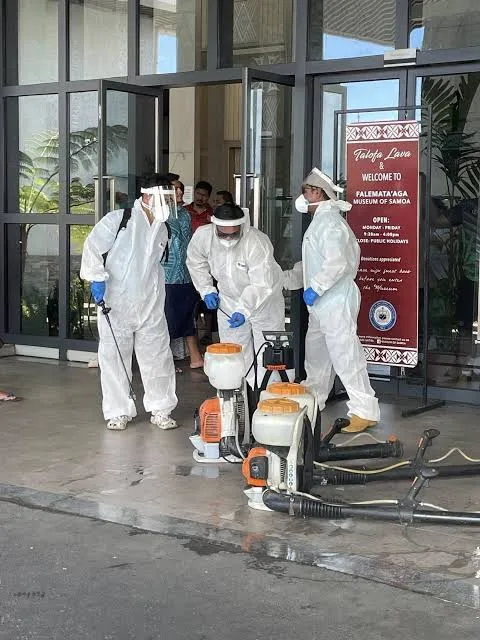New Zealand | August 8, 2025
The Pacific island nation of Samoa is in the throes of a major dengue fever outbreak that has seen over 5,600 clinically diagnosed cases since January, placing immense pressure on its limited healthcare infrastructure and tragically claiming the lives of at least five children. In response to a formal request from Apia, New Zealand has swiftly dispatched a small but critical health team and a significant supply of medical provisions, underscoring the deep-seated ties between the two nations and highlighting the fragility of health security in the Pacific region. The outbreak, which was officially declared in April, is now at a critical stage, with hospital resources being stretched thin and public health officials fighting a difficult battle to contain the mosquito-borne virus.
The scale of the outbreak is unprecedented in recent years, with a surge of new cases reported weekly across both of Samoa’s main islands, Upolu and Savai’i. This has created a crisis at the Tupua Tamasese Meaole Hospital, the nation’s primary medical facility, where normal day-to-day operations have been significantly altered. The hospital has been forced to revise its outpatient hours, now only attending to patients with dengue-like symptoms from 6 p.m. until the morning, and has had to set up dedicated wards to manage the influx of severe dengue cases. The situation has been exacerbated by the fact that Samoa is currently under the leadership of a caretaker government, which, while assuring the public that budgetary concerns will not impede the emergency response, has had to manage the crisis with restricted access to the annual budget.

The personal toll of the outbreak is becoming increasingly stark. The five confirmed or probable dengue-related deaths of children have deeply impacted the nation. Among them was a 12-year-old boy who contracted the disease in April and a two-year-old boy who died recently, both of whom were unable to be medically evacuated in time to receive more advanced care. These tragedies underscore the desperate need for robust health infrastructure and rapid-response capabilities in small island states that are highly vulnerable to epidemics.
In an act of solidarity and regional partnership, New Zealand has been quick to respond to Samoa’s distress call. The New Zealand Ministry of Foreign Affairs and Trade (MFAT) confirmed that it is coordinating a multi-pronged support effort. The centerpiece of this aid is the deployment of a small team of clinical specialists and public health officials who will provide on-the-ground assistance in Apia. Their mandate is not only to help manage the immediate patient surge but also to work with Samoan authorities to assess longer-term needs and strengthen the local health system’s capacity to handle future outbreaks. New Zealand’s Foreign Minister Winston Peters, in a statement, affirmed, “Samoa and New Zealand have a special relationship and we stand with them in this time of need. We stand ready to provide further support as requested by Samoa.”
In addition to the human resources, New Zealand is also providing approximately NZ$300,000 (£150,000) worth of medical supplies. These supplies are crucial for a nation struggling with limited resources and will be used to bolster everything from fever management and rehydration therapies to more complex medical interventions for severe dengue cases. This assistance is part of a long-standing pattern of cooperation between the two countries, which saw New Zealand deploy a large medical assistance team to Samoa in 2019 during a devastating measles outbreak that killed dozens.
The dengue epidemic in Samoa is part of a wider trend affecting the Pacific region. Several other island nations, including American Samoa, Fiji, and the Cook Islands, are also experiencing a sharp rise in cases. The mosquito responsible for transmitting dengue, the Aedes aegypti, thrives in tropical climates and its proliferation has been linked to factors like climate change, urbanization, and poor sanitation. While New Zealand itself does not have the mosquito species capable of transmitting the disease, its public health officials are on high alert. The number of dengue cases among travellers returning to New Zealand from the Pacific has surged, with over a hundred cases recorded so far this year, double the number for all of 2024. This has prompted health authorities to issue a strong warning to New Zealanders traveling to the region, urging them to take strict precautions against mosquito bites.
The situation in Samoa serves as a stark reminder of the interconnectedness of global health and the disproportionate impact that such outbreaks can have on smaller, more vulnerable nations. The World Health Organization (WHO), which had recently praised Samoa for being the first Pacific island nation to launch a National Action Plan for Health Security, is also providing technical support and guidance. However, the current crisis highlights that despite having a plan, the resources needed to execute a robust emergency response can be overwhelming.
For the international community, the events in Samoa are a case study in how to respond to regional health crises. The swift and collaborative response from New Zealand is a model of regional cooperation that demonstrates the value of strong bilateral relationships. As the crisis continues to unfold, the focus will remain on containing the outbreak, treating the sick, and ensuring that Samoa’s health system is not only supported in the short term but also strengthened to prevent and manage future epidemics. The UK and other European nations have also updated their travel advisories, urging citizens travelling to the Pacific to be vigilant and take precautionary measures, a clear sign that this regional health crisis has far-reaching international implications.
